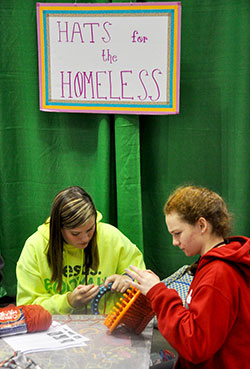National Catholic Youth Conference 2015
Service opportunities in thematic park engage youths in ‘a key part of our faith’

Katie Schisler, left, and Clare Kelly, both of the Diocese of Wilmington, Del., knit hats for the homeless as an act of service on Nov. 20 during the National Catholic Youth Conference in Indianapolis. (Photo by Natalie Hoefer)
By Natalie Hoefer
As Clare Kelly wove the colorful yarn around the circular, plastic loom, she explained what she was doing.
“I’m making a hat for a poor person,” said the youth of the Diocese of Wilmington, Del. “Cold weather is coming, and many people don’t have hats, so it will be really helpful for them in the cold winter months.”
Clare was making the hat in the service section of Camp Tekakwitha, the thematic park at the National Catholic Youth Conference (NCYC) held at the Indiana Convention Center in Indianapolis on Nov. 19-21.
The service area was designed to engage youths in an important aspect of being Catholic—serving others, an aspect Clare seemed to already understand.
“It’s important to be charitable,” she said. “You never know when you might bring joy or hope into someone’s life.”
Aaron Frazita, a member of the thematic park committee, explained more about the role of service at NCYC.
“Service is such a key part of our faith,” he said. “I don’t think we can say we’re Christians unless we put our faith into action. NCYC is a place where we need to make the young people aware of those things.”
To accomplish that, the service section offered information and hands-on activities at nearly 10 stations, like the hat-knitting area.
Beggars for the Poor, a volunteer-run ministry that helps the homeless in Indianapolis, will give the knitted hats to those whom they serve.
“It makes the kids really aware that people need help—not just your financial support, but your volunteering,” said Beggars for the Poor volunteer Lynda Knable. “The kids seem to really get it.”
On the other side of the service section, youths sat at tables writing messages and making designs on T-shirts and tote bags for Haitians.
“We’ll be sending these T-shirts and tote bags to our sister parishes in Haiti when all this is finished,” said Father Thomas Clegg, pastor of St. John Paul II Parish in Clark County.
“It’s also an opportunity to do a little education about Haiti at the same time. Teenagers naturally want to serve. To provide an opportunity for them to do that here [at NCYC] is not only a good thing, but is essential for their understanding of what a total Christian person looks like.”
Mariah Brown of the Archdiocese of Kansas City, Kan., was excited about the opportunity to make an item to send to Haiti.
“When I get older, I really want to go on mission trips,” she said. “I hear about people who need our help, and I feel like I’m obligated to help because we have so many resources.”
In another section of Camp Tekakwitha, Catholic Relief Services (CRS) operated food package preparation stations as part of their Helping Hands Program.
“It’s a program where participants come together to package meals to send to our hungry brothers and sisters in Burkina Faso, which is a country in West Africa,” said Rachel Malinowski, a program relief officer for CRS.
“[For] the people who live [in Burkina Faso], there’s just not enough food available. It’s not even an access problem—there just isn’t enough food available. So these meals are life-changing for them.”
Each pouch of food makes from 6-8 meals, Malinowski said. During NCYC, 50,000 pouches were completed.
Participants learn not just about the project to feed the hungry in Burkina Faso. They also learn about other Helping Hands programs.
“We do a pre-education session before folks go to package the meals,” she said. “The meals do meet the short-term need, but more importantly, Helping Hands sends grant funds to the centers [in Burkina Faso] for long-term, income-generating projects so folks can learn skills to be able to lift themselves out of poverty in the long run and hopefully not need that food aid in the future.”
Emma Wagner of the Diocese of Savannah, Ga., participated in the Helping Hands project, filling pouches with food.
“I like helping others, knowing it’s doing some good in the world and being selfless,” she said. “We’re all God’s children, and we need to help each other.”
Bishop Emeritus John Kevin Boland of the Diocese of Savanah, stood across from Emma as he helped fill the food pouches.
“They voluntarily wanted to do this [project] as a spirit of giving, to give back,” he said of the youths he accompanied. “We live in a society with plenty of food, and there are lots of places where there’s no food. We find ourselves by giving, not receiving.”
He looked around at all the youths busy at the Helping Hands stations, and beamed with pride.
“These kids [at NCYC] are the cream of the crop,” he said. “You won’t find better in the U.S.” †
See more coverage of NCYC here
